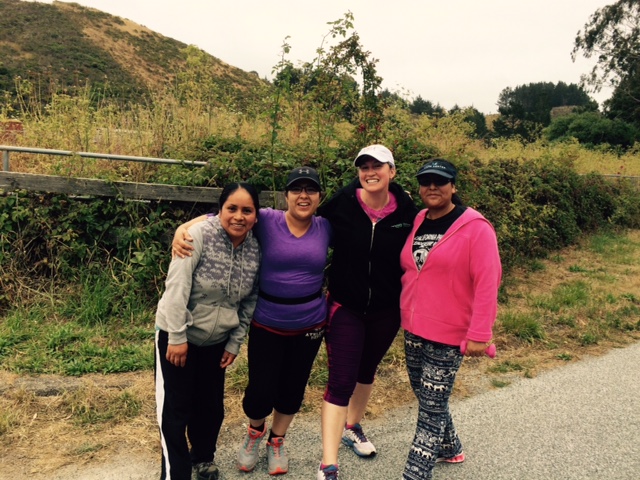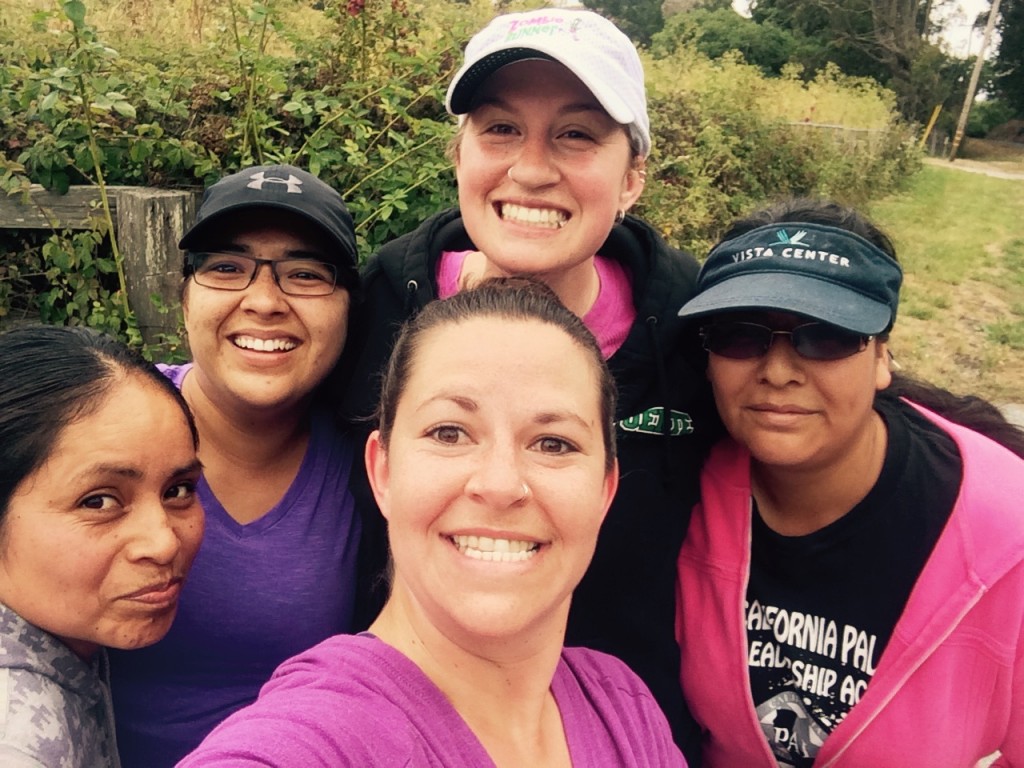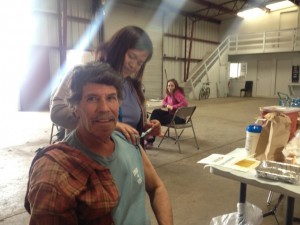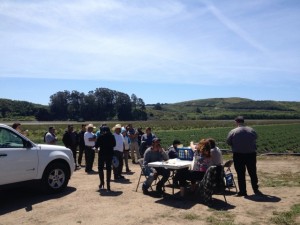Isela Bustos remembers it well: the cloudy morning in March when she finally decided to talk to Yessenia Serratos, who was walking alone as usual down Stage Road in her workout clothes. She’d been seeing Serratos walking in Pescadero every morning, a solo figure on the road, rain or shine, since January. After dropping her kids at school, she slowed down and pulled up alongside Serratos, rolled down her window, and asked: what, exactly, was the goal of all this walking?
And… could she come too?
“I remember she was walking really fast, because she said she was afraid to walk alone,” says Bustos, with a laugh.
Join me tomorrow morning, Serratos replied.
And so began the grassroots fitness group, known simply as “the walking group,” that meets every morning in front of Pescadero Elementary and departs on a three-mile circuit of downtown streets before climbing a hilly road near the town cemetery.
Some mornings as many as eight women join in, chatting, laughing, and puffing their way to fitness and good health. Serratos has a pedometer strapped to her arm that also blasts music from a Bluetooth speaker, ensuring that 8 to 9 a.m. always feels more like a dance party than a workout.
The merriment helps offset the hard work the women are doing: losing weight, battling depression, increasing their fitness and flexibility. Many of them join Serratos in her commitment to walking every weekday – on cold mornings, wet mornings, mornings when the Pacific wind is a misery, not a pleasure.
But why? “I did it for myself, to have energy and strength,” explains Serratos, a 39-year-old homemaker with glasses and a can’t-sit-still energy who sandwiches a laugh in between every sentence. She started walking in December following a difficult surgery; her doctor warned her that if she didn’t lose weight and change her lifestyle to include a healthier diet, she would face more medical problems. And she wasn’t even 40.

Elvira, Yessenia, Abby, and Yesi are part of the running and walking group in Pescadero.
So, with no prior exercise experience, Serratos devised a walking route that she could follow after dropping her kids off at school and be back in an hour. She has not skipped a day since December. In April she started coming to Zumba as well, which Puente offers two evenings a week in Pescadero and once a week in La Honda.
Seven months ago, she weighed 170 pounds. Now she weighs 145.
“Look at this.” Serratos pulls out a photo of herself in a pink shirt, looking heavier and standing, unsmiling, for the camera; the photo was taken in front of a strip mall in Gilroy three years ago. “This photo motivates me to never go back. I get depressed when nothing fits me. People would always ask me if I was pregnant.”
When she joined Serratos on her morning Pescadero circuit, Bustos thought she might last two weeks. She had problems of her own with anxiety and chronic pain. Soon after she started walking, her doctor offered her medications – but she declined, because she already had a sense that the walking cure was taking effect. She was right. “I had a lot of back pain; I was having trouble sleeping. When I started walking, it went away – it only happens once in a while now,” says Bustos. “My knee was also hurting – I was feeling needles there – and it’s gone away.”
Bustos has seen other changes: to her weight (she’s lost 25 pounds), to her self-esteem, and to her eating habits. “I like it because I don’t have to pay a gym to help me lose weight. And I save because I eat less.”
Bustos’ family approves. “My husband says it’s been a long time since he’s seen me like this,” she says with a giggle. “Even my son says, ‘What happened to mom? She’s changed so much.’”
Stories like Bustos’ are becoming common among local mothers, a group that Puente has served over the years with targeted programs to battle maternal depression and workshops on selecting and cooking nutritious food. It’s a very good sign that those messages are resonating on a deeper level, says Molly Wolfes, Community Health Coordinator for Puente.
“The most exciting part of this is that it evolved within the community,” she says. “I think it says a lot about where the community is going. People are becoming more aware of their health.”
You can see it in the very full Zumba classes at Puente, including a new class in La Honda on Wednesdays at 5 p.m.
“Even the kind of food that people bring to events is changing. When I got here it was coke and brownies and chicharrón. Now people are bringing beans and fruit and water with cucumber in it,” adds Wolfes.

Yessenia Serratos, second from left, and Molly Wolfes, front center, with members of the Pescadero running and walking group one week.
Now the walking group has taken their goal-setting to a whole new level. Many of the women, who could barely walk three miles six months ago, have decided to enter Puente’s third annual Veggie Fun Walk/Run, a 5k run/walk on August 15. The 5k is the brainchild of Puente staff member Abby Mohaupt and has become known as the event where people dress up in funny fruit and vegetable costumes. It takes place during the Pescadero Arts and Fun Festival.
Many of the women in the walking group have never run a race before and they are taking their training seriously. Several Puente staff members, including Mohaupt, Wolfes, and Mariela Lopez, walk together with the group, and they report that many of the women have overtaken them and are going faster and farther than they do. They have even run the racecourse already to see if they could do it.
Bustos has never run a race before, and she thinks she will succeed if she runs for a few minutes and then slows to a walk, before picking back up again. “I’m a little nervous and a little excited,” she confesses. “Yessenia said she’s doing it, so we’re really going to help each other – give each other energy.”
Serratos herself has no fears about the 5k. She’s not only feeling empowered these days. She feels limitless.
“Sometimes I say to myself, I want to fly, to fly!” she exclaims, laughing again and again. “I can’t fly, so I had to learn to run.”
Register for Puente’s third annual 5k Veggie Fun Run/Walk ahead of August 15 and save $3 off the $15 ticket price. Enjoy local food at the finish line. Runners and walkers welcome. Kids and dogs, too. Details and registration here: https://www.eventbrite.com/e/third-annual-puente-5k-fun-runwalk-tickets-16706472509






